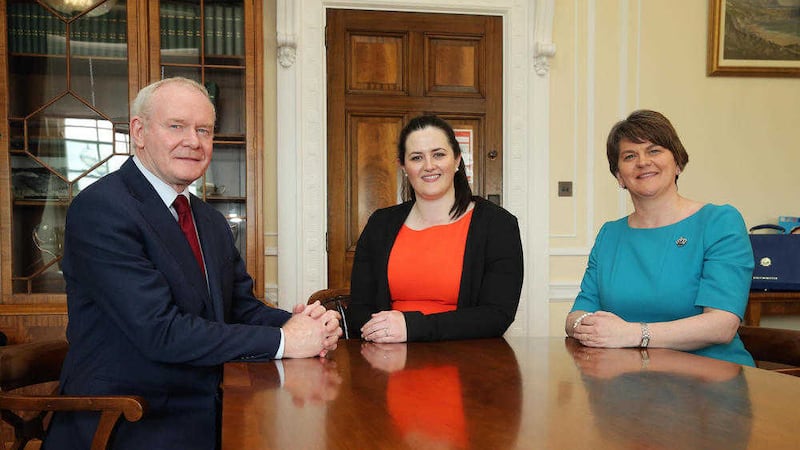IN March 1972 the Northern Ireland Parliament was closed, bringing to an end what was, in essence, a one-government, one-party state.
Almost 45 years later and we seem to have replaced that system of government with a two-party, two-state system. Those two parties, the DUP and Sinn Féin, have diametrically opposing views on the constitutional future of Northern Ireland, as well as mutually contradictory policies on education, culture, legacy, health and economics.
Their relationship since 2007 has been fractious for long periods and catastrophically bad at other times. They have managed to leave most of the `big ticket' issues unresolved. Backbench members from both parties barely talk to each other outside the confines of an Assembly committee.
Yet the electorate has again given these two parties a whopping mandate to work together: 54 per cent of the vote and almost two-thirds of the seats. And, in fairness to them, they seem to be rising to the challenge this time. There were some early concerns that the appointment of - or failure to appoint - a justice minister could lead to a second election, yet both Foster and McGuinness insisted they had everything under control (and they did).
They brushed off the UUP and SDLP decision to opt for opposition. They refused to grant what Alliance was demanding for taking the justice ministry again. They stood together. They acted together. They made life easy for each other.
Ok, it's clearly far too early to assume that a new era of honest, consensual cooperation has broken out; but it is, at the very least, an indication that the two parties have accepted that they are on their own for the next five years. There are no excuses for not working together. They are the government. And even though Claire Sugden is the justice minister (and, believe me, she is very, very talented) much of what she does will be steered by their joint view on each issue.
I think the most important thing they could do over the next few months would be to move away - as I wrote here a couple of years ago - from the notion that `nothing is agreed until everything is agreed'. All that does is create a political/policy bramble bush in which everything ends up snagged on something else; meaning that decisions are either shelved altogether or so watered down that they are rendered utterly ineffective.
Surely it would be better to resolve one issue - even smallish ones - at a time and bank each success as they go along? Also, each new success makes it just that little bit harder for the new official opposition to get under their skin and expose their differences.
The same applies to the UUP and SDLP. If they are genuinely hungry for political and electoral relevance again then they need to make opposition work and they need to make it work together. They don't have the numbers or resources to provide effective separate oppositions and if the DUP and Sinn Féin get their act together and focus on agreed policies then they'll actually be putting pressure on Nesbitt and Eastwood, rather than the other way around.
So I was a little bit concerned when I heard Nesbitt say that, for the time being, the UUP and SDLP would be working separately. Neither party is big enough, or brimming with enough talent, to make separate, competing oppositions a serious option.
The Alliance party has some serious thinking to do, as well. They didn't have a good election and will be disappointed not to be in the Executive - either in their own right, or as part of a deal to carry on with justice. And nor are they entitled to be part of the official opposition, either. All of which means that they will have to try a little bit harder to have their voice heard. I'm also pretty sure that David Ford will be standing aside as leader fairly soon, leaving it to Naomi Long to prepare the party for the next round of elections, beginning in 2019.
During a radio interview on Wednesday morning, a few hours before the Executive was appointed, I noted: "This is a new day for Northern Ireland. A new government. A new opposition. A genuine chance for politics to be done differently. The moment to end Groundhog Day." Although that sounds very optimistic for me - it occasionally happens, by the way - I really do hope that the next five years will mark the sort of progress that most of us have been arguing for since 1998.







